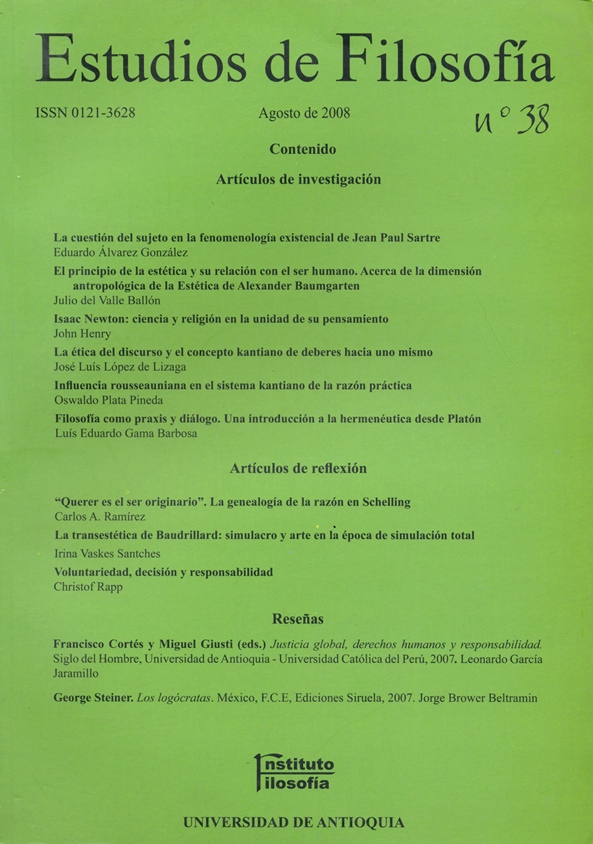El principio de la estética y su relación con el ser humano. Acerca de la dimensión antropológica de la Estética de Alexander Baumgarten
DOI:
https://doi.org/10.17533/udea.ef.12696Palabras clave:
Ilustración, Estética, verdad estética o extensiva, analogía, felix aestheticus.Resumen
El artículo tiene como eje central la presentación del sentido original con el cual nace la Estética, como disciplina filosófica, de la mano de Alexander Baumgarten. Está dividido en tres partes: la primera con la finalidad de contextualizar históricamente el nacimiento de la Estética y su idea base es que la Ilustración es un movimiento de raíz europea con un cariz preeminentemente antropológico. La segunda parte se concentra en presentar y explicar los conceptos centrales de la Estética de Baumgarten, a saber: que ella es una reflexión acerca de lo particular en tanto particular. La tercera parte vincula la reflexión estética con la dimensión humana. La idea base de esta tercera parte, aquella que le da sentido a todo el artículo, es que la Estética de Baumgarten se dirige hacia la construcción de un ser humano completo, aquella persona que sabe integrar su razón y su sensibilidad, y encuentra en ello una feliz armonía. Tal ser humano será llamado el felix aestheticus.
Descargas
Citas
BAUMGARTEN, Alexander. Aesthetica. Georg Olms, Hildesheim, 1970.
BAUMGARTEN, Alexander. Ästhetik. Meiner, Hamburgo, 2007.
BAUMGARTEN, Alexander. Meditationes philosophicae de nonnullis ad poema pertinentibus. Halle 1735.
BAUMGARTEN, Alexander. Philosophische Betrachtungen über einige Bedingungen des Gedichtes. Felix Meiner Verlag, Hamburg, 1983.
BAUMGARTEN, Alexander. “Reflexiones filosóficas en torno al poema”, en: Belleza y verdad: sobre la estética entre la Ilustración y el Romanticismo. Alba, Barcelona, 1999.
BAUMGARTEN, Alexander. Theoretische Ästhetik. Die grundlegenden Abschnitte aus der “Aesthetica”. Versión bilingüe en latín y alemán a cargo de Hans Rudolph Schweizer. Meiner, Hamburg, 1988. DOI: https://doi.org/10.28937/978-3-7873-2571-9
BODMER, Johann Jacob y BREITINGER, Johann Jacob. Kritische Abhandlung von der Natur, den Absichten und den Gebrauch der Gleichnisse, 1740.
BOILEAU, N. De Sublimitate, Paris, 1674.
BOILEAU, N. Satires, Epîtres, Art poétique. Gallimard, Paris 1985.
CASSIRER, E. La filosofía de la Ilustración. FCE, México, 1997.
CIAFARDoNE, R. L ́Illuminismo tedesco. Loescher, Torino, 1983.
DESCARTES, R. Discurso del método, primera parte. Trad. de Risieri Frondizi. Alianza Editorial, Madrid, 1985.
DESCARTES, R. Meditaciones metafísicas, en: Obras escogidas, Editorial Sudamericana, Buenos Aires, 1967.
DUBOS, Jean Baptiste. Réflexions critiques sur la poésie et sur la peinture, 1719.
GADAMER, H-G. Verdad y Método. Fundamentos de una hermenéutica filosófica. Ediciones Sígueme, Salamanca, 1988.
GoTTSCHED, Johann Christoph, Versuch einer Critischen Dichtkunst vor die Deutschen, 1730.
GROSS, S. Felix Aestheticus. Die Ästhetikals Lehrevom Menschen. Zum 250. Jahrestag des Erscheinens von Alexander Gottlieb Baumgartens «Aesthetica». Könighausen & Neumann, Würzburg.
LESSING, G.E. Briefe, die neueste Literatur betreffend, carta 52, del 23 de agosto de 1759. Reclam, Stuttgart.
POPPE, B. Alexander Baumgarten. Seine Bedeutung und Stellung in der Leibniz-Wolf schen Philosophie und seine Beziehung zu Kant, Diss. Münster, 1907.
RICHTER, J. P.F. Vorschule der Aesthetik. Meiner, Hamburgo.
SCHoLZ, G. Schöner Geist, Schönheit. Historisches Wörterbuch der Philosophie, t. 3, columnas 1385-1387, Schwabe & Co., Basilea, 1974.
STOLLBERG-RILINGER, B. Europa im Jahrhundert der Aufklärung. Reclam, Stuttgart, 2000.
ZELLE, C. Die doppelte Ästhetik der Moderne. Revision des Schönen von Boileau bis Nietzsche. Weimar, Stuttgart, 1995. DOI: https://doi.org/10.1007/978-3-476-03632-2
Descargas
Publicado
Cómo citar
Número
Sección
Categorías
Licencia
Derechos de autor 2008 Julio del Valle

Esta obra está bajo una licencia internacional Creative Commons Atribución-NoComercial-CompartirIgual 4.0.
Los autores que publican en Estudios de Filosofía acuerdan los siguientes términos:
1. El Autor retiene el copyright del "Artículo", por el cual se entiende todos los objetos digitales que pueden resultar de la subsiguiente publicación o distribución electrónica.
2. En conformidad con los términos de este acuerdo, el autor garantizará a Estudios de Filosofía como Editor el derecho de la primera publicación del artículo.
3. El Autor le concederá al Editor un derecho perpetuo y no-exclusivo, así como una licencia de la misma clase, de publicar, archivar y hacer accesible el Artículo parcial o totalmente en todos los medios conocidos o por conocerse, derecho y licencia que se conocen como Creative Commons License Deed. Atribución-No Comercial- Compartir igual CC BY-NC-SA o su equivalente que para efectos de eliminar toda duda, le permite a otros copiar, distribuir, y transmitir el Artículo bajo las siguientes condiciones: (a) Atribución: Se deben reconocer los créditos de la obra de la manera especificada por el Autor a Estudios de Filosofía, pero no de una manera que sugiera que tiene su apoyo o que apoyan el uso que hace de su obra. (b) No Comercial: No se puede utilizar el Artículo para fines comerciales.
4. El Autor puede realizar otros acuerdos contractuales no comerciales para la distribución no exclusiva de la versión publicada del Artículo (v. gr. ponerlo en un repositorio institucional o publicarlo en un libro) con la condición de que haga el debido reconocimiento de su publicación original en Estudios de Filosofía.
5. A los Autores se les permite y Estudios de Filosofía promueve publicar en línea (online) la versión pre-impresa del Artículo en repositorios institucionales o en sus páginas web, antes y durante la publicación, por cuanto que puede producir intercambios académicos productivos, así como una mayor citación del Artículo publicado (ver The Effect of Open Access). Dicha publicación durante el proceso de producción y en la publicación del Artículo se espera que se actualice al momento de salir la versión final, incluyendo una referencia a la URL de Estudios de Filosofía.















